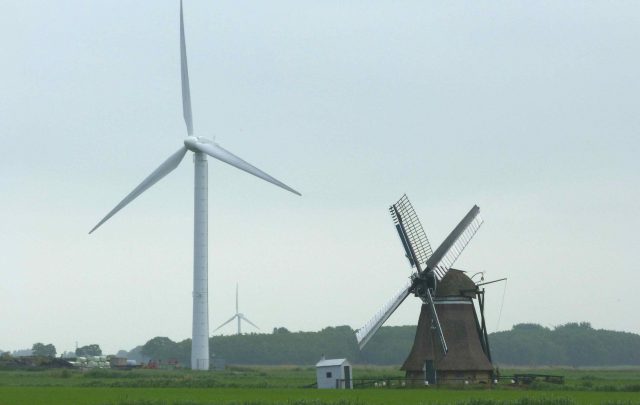
Alan Pierson, Alarm Will Sound artistic director, will lead the Alabama Symphony in a concert featuring music of Vivaldi, Haydn and Ruehr. I spoke to Alan about the performance, his preparation, relationships between old and new music and working with a chamber ensemble versus a large orchestra.

Mike: Do you see a lot of overlap or similarities between early music and contemporary music?
Alan: One big similarity is just the kind of people who do them. I think both early music and new music attract pioneering, creative, left field types, which is a lot of why I’ve been drawn to both. When those of us who founded Alarm Will Sound were still students at Eastman, a lot of us were doing early music there too. Growing up, it was new music that excited me first. Recordings of baroque and early classical music seldom connected with me as a kid. But that changed when I started studying with people at Eastman like Malcolm Bilson and Gretchen Wheelock, learned about how composers from that time thought about their music being played, and began to understand how much there is in this repertoire beyond what’s literally on the page, sort of like how jazz is now. That opened up a new frontier for me, with performances by people like Frans Brüggen, John Eliot Gardiner, the Freiburger Barockorchester, and Gli Incogniti. All of that made this music feel really exciting and feel fresh and current in a way that it never had to me. And there was a group of us at Eastman—including several people who later started Alarm Will Sound—that organized an ensemble called Nuove Musiche that was devoted to performing early classical repertoire in an historically-informed manner.
So I think what both new music and early music have in common is that both demand a lot of creativity and imagination to really play at the highest level. Of course all music demands creativity, but when you come to a piece of contemporary music—especially one that’s not been played before—you don’t have a recording to go off of, and you have to figure out for yourself how to make it work. Similarly with early music, there’s so much stuff that’s not on the page. And what that “stuff” is is very much up for discussion. The music is meant to be spontaneous, fresh, and flexible in a way that isn’t necessarily what you see on the paper. To bring that off also demands a great deal of creativity and spontaneity. So I think that both of these fields attract entrepreneurial and creative musicians.
Mike: Both are kind of surrounded in this fog: early music is a fog of interpretation, of reading the texts that we have without actually having recordings, only having an idea of what it sounded like through words. Contemporary music is surrounded in a fog in that we don’t have direct access to the composer all the time and there isn’t a performance practice yet.
Alan: Though in Alarm Will Sound we almost always work with the composers. And that’s awesome. But it’s also sort of like always having an answer sheet. Part of the challenge and also the fun of taking on early music is not having the composer there to tell you exactly what they want. Though I’ve also had lots of experiences with composers hearing something in their own music done differently than how they originally imagined it and liking it. Steve Reich, when he’s working with performers he trusts and who he feels get his music, likes to say “just pretend I’m dead.” It’s his way of stepping out of the way and letting the performers make the music their own. Which I really appreciate. And that’s part of the fun of going back to early music because there is so much room to make it your own. Much as I’d also love to know better how Vivaldi and Haydn imagined their music sounding.
There’s also additional freedom that comes from the fact that we’re playing this music on all the wrong instruments. So even if we knew exactly how Vivaldi or Haydn imagined their music—and I suspect there isn’t a single answer to that anyway—we don’t have the instruments that they had, and so we’re translating their work to a different medium, really, with modern instruments.
Mike: In Alabama, are you using the full compliment of strings for the Vivaldi and Haydn?
Alan: No, it’s smaller. That’s something I’ve thought a lot about: What’s the best size for the group and this music? Definitely it’s not a full symphonic string section.
Mike: What’s the reasoning for that choice? Just because the orchestras of the time had been smaller, or is there another aesthetic?
Alan: Yes, orchestras of the time were generally smaller. It’s so easy for this music to feel heavy, pedantic, and wooden, I love Vivaldi and the early Haydn with a kind of lightness and buoyancy and flexibility, and that’s easier to achieve with a smaller group.
Mike: With a smaller group, you also have a more intimate setting. With Alarm Will Sound, we have discourse: We talk about the musical decisions that we’re going to make, and being a small orchestra helps that (that we’re more of a chamber ensemble). With a smaller compliment in Alabama, are you anticipating doing the same sort of procedure or are you just going to deal with the limited rehearsal time by telling your interpretation and going from there?
Alan: In a way, both. Something I enormously love in Alarm Will Sound is its collaborative spirit. It’s something I believe in very deeply, and I think it produces the best results. The conventional orchestra model is a weird thing: all of these players have been playing together for years, and then I’m supposed to come in and impose my interpretation of Vivaldi on them? That’s weird and awkward and not really, I think, how great music-making happens. Or at least it’s not how I like to work.So I do come in with as well-developed a vision of the music as I can. I’ve been thinking about this music a great deal, and reading up on performance practice. But I also expect also that my vision isn’t going to be exactly what happens. I’ll see how they play and then work with it. It’s a dance and an improvisation.
Mike: There’s a contemporary piece on the program, Shimmer by Elena Ruehr. She was your composition teacher at MIT?
Alan: Yeah, when I first came to MIT, Elena taught my freshman year theory class. She was a first-year professor just out of grad school. I forgot how she ended up showing me her music, but somehow I saw a score to her piece Sky Above Clouds, which she had just finished as part of her doctoral program at the University of Michigan, and just fell in love with it. It hadn’t been premiered yet, and I ended up conducting the first performance at MIT with a student group I put together. Elena wanted to be sure I was up to conducting it, so she gave me a little audition: having me conduct some 5/8 for her, since that’s the time that goes for much of the piece. I gave the first performance of that piece have loved her music ever since. When we started Ossia (the group that spun off Alarm Will Sound) at Eastman in 1997, we did Elena’s Sky Above Clouds to open our very first concert, and she came out for the performance. Elena and I have been very good friends for years now, but that was the last time I played her music. That’s been a really nice part of this concert: having a chance to perform Elena’s music and work with her again. She’s coming down for the concert, which I’m really excited about that.
Mike: Did you program that piece?
Alan: Yes. The Four Seasons was already set, and Pierre Ruhe (the orchestra’s Director of Artistic Planning) asked me what else I wanted to perform and suggested something contemporary. Elena’s piece, Shimmer, was inspired by Vivaldi and was the perfect contemporary piece to include on the program that would feel connected to the Four Seasons. It’s also a piece I’ve wanted to do for years.

